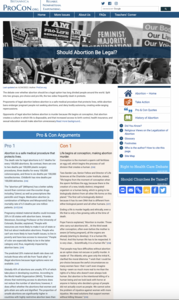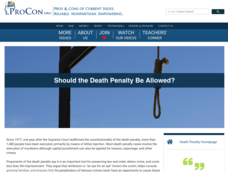Smithsonian Institution
Civil War
Did you know that more than three million people fought in the Civil War? Through artifacts, graphics, and passages class members learn about the stark divide between North and South that led to the war, as well as about the events that...
Smithsonian Institution
Eastern Indian Wars
Many know that Native Americans were forced off their lands and moved west, but how did these people react? The Red Sticks faction of the Creek nation opted to defend themselves and their lands in a series of wars called the Eastern...
University of North Carolina
Anthropology
Anthropologists ask the question that everyone wants answered: what does it mean to be human? An online handout provides a brief introduction to the study of anthropology and outlines three common types of anthropology writing...
Wuthering Heights
The Reader’s Guide to Emily Bronte's Wuthering Heights
Researching the characters, setting, and background history of a work of literature enhances interest and improves reading comprehension. An interactive website contains a wealth of resources related to Emily Bronte's novel Wuthering...
University of North Carolina
Literature (Fiction)
An informative installment of the Writing for Specific Fields series helps readers learn how to interpret and write about fiction. The website details nine easy steps for writing a literary analysis—a useful method for all readers!
Mr. Nussbaum
Martin Luther King Reading Comprehension
Boost reading comprehension with an interactive website featuring an informational passage about Martin Luther King Jr. Scholars read, or listen to, several paragraphs detailing MLK's life in order to answer seven multiple choice...
National Constitution Center
Civil Liberties and Rights Worldwide
How do governments differ in how they protect human rights? While the United States prides itself on its Bill of Rights, other countries have their own ways of protecting citizens' liberties. An interactive website, paired with...
Curated OER
Abortion
Abortion has remained a highly controversial issue ever since the landmark 1973 Roe v. Wade decision. Using the website, learners sift through all the information they need to participate in a debate about the topic. They learn about the...
Curated OER
Animal Testing
Animal testing: cruel and inhumane, or innovative and life-saving? Scholars explore the topic and form their own opinions with help from the highly informative website. Pupils read a comprehensive overview of the topic, including...
Curated OER
Cell Phone Radiation
Should people be more worried about cell phone radiation? Scholars read extensive background information about the issue to prepare for a class discussion or debate. As they explore the website, they learn the main arguments for and...
Curated OER
Churches and Taxes
Churches have been tax-exempt since the founding of America, but should they be? Pupils ponder the question as they browse the website in preparation for a class debate or discussion. They research the history of tax-exemption for...
Curated OER
College Education
What do Bill Gates and Mark Zuckerberg have in common? They're both billionaires, and neither one has a college degree! Using the website, scholars explore whether having a college education is truly worth the money it costs. They read...
Curated OER
Corporal Punishment
Nineteen states legally permit school officials to physically punish children. Scholars learn more about the topic as they use the website to prepare for a class debate or discussion. Pupils read background information and discover the...
Curated OER
Corporate Tax Rate and Jobs
Does lowering the corporate tax rate help create jobs in the United States? Learners explore the top pro and con arguments and quotes relating to the issue. They read background information about the creation of the federal corporate...
ProCon
Cuba Embargo
President John F. Kennedy bought 1,200 Cuban cigars the night before he enacted the Cuban trade embargo in 1962. Should the United States maintain the embargo? Using the website, pupils explore the topic to prepare for a class debate or...
iCivics
Step Four: Working with Websites
Almost every profession today relates to websites in some way! The resource tasks the class to fill out three individual graphic organizers to help them analyze each website they visit.
ProCon
Daylight Savings Time
An entomologist named Geroge Vernon Hudson is credited with proposing Daylight Saving Time (DST) so he could better study his insects. Using the informative website, scholars read a brief introduction to the topic and then explore the...
ProCon
Death Penalty
Should the United States continue the practice of capital punishment? Scholars set out to answer the question in preparation for a class debate or discussion about the death penalty. They watch videos, analyze charts about death penalty...
ProCon
Drinking Age
Eighteen is the age of adulthood in the United States, but 21 is the legal drinking age. Pupils use the provided website to determine whether the age to legally purchase and consume alcohol should be lowered. They weigh the pros and...
ProCon
Gold Standard
If all the mined gold in the world was melted across a football field, it would rise 5.4 feet. That's just one interesting fact pupils learn when using the debate topics website to determine if the United States should return to a gold...
ProCon
Is Homework Beneficial?
Does homework improve student achievement, or does it increase stress? Scholars use the included debate topics website to prepare for a class discussion or debate about whether homework is advantageous. After reading a brief background...
ProCon
National Anthem Protests
San Francisco 49ers quarterback Colin Kaepernick refused to stand for the National Anthem in 2016 as a form of protest. Were his actions appropriate? Using the provided website, pupils attempt to decide for themselves by reading the main...
ProCon
Milk
Milk: It does a body good ... or does it? Using the provided website, scholars sort through information to answer the question. They review a chart demonstrating lactose intolerance by ethnicity and region, and they also compare the...
ProCon
Minimum Wage
The first ever minimum wage in America was set at 25 cents per hour in 1938 and has been steadily, if slowly, increasing ever since. Using the provided website, pupils decide if the United States should further increase the federal...
Other popular searches
- Teacher Websites
- Web Design
- Credible Websites
- Evaluating Websites
- Ancient Greece Websites
- Kids Websites
- Eric Carle Website
- Interactive Websites
- Adding Fractions Websites
- Websites
- Interactive Web Site
- Website Evaluation

























